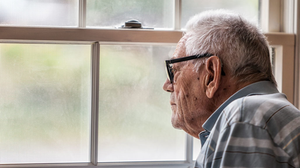Wellbeing Wednesday: Loneliness, friendship and Covid-19

To mark this year's International Day of Friendship on Thursday (30 July), Unipart Logistics Internal Communications Consultant Anne Wilde considers the importance of friendship throughout our lives.
I am one of those people who doesn’t make friends very quickly, but when I do, you will be on my Christmas card list for life! I have always had a network of long-standing friendships and never really understood the issue of loneliness - until my mother died, 10 years ago.
My parents had lived in Spain for around 20 years and enjoyed very active social lives. When my mum contracted a terminal illness, that all changed. Dad cut himself off from everyone to focus on caring for her for almost two years. When she finally passed, he felt lost and incredibly lonely, so decided to return to the UK to be close to his family. But the loneliness has never left him.
This taught me two things: the world must be full of lonely people, and however strong your relationship, or however busy you may be, it is vitally important to maintain connections with good friends.
Seeing what my dad was going through encouraged me to become a befriender with Age UK. I soon found he was not the only one suffering from loneliness following the loss of a partner. I became very good friends with Charles who lived nearby. He had lost his wife, had no family nearby, and was house-bound through ill health. It wasn’t about caring for him or running errands. It was just about sitting and having a proper chat over a cup of tea. My visits became the highlight of his week. He would tidy up and put on his best shirt, before playing the piano for me and sharing stories of his younger days. It was rewarding for me too. We laughed a lot and he taught me so much.
To find out more about you can volunteer at Age UK, click here.
Loneliness amongst young adults

There has been a steady decline in social connections amongst younger people as global mobility has taken people away from friends and family. Unsocial working hours can also be very isolating for young people who feel they should be out, enjoying a more active social life.
According to a recent YouGov survey conducted in the US, millennials are emerging as the loneliest generation - particularly so since the outbreak of coronavirus. This could be because social media distracts people from making friends in real life but also because this generation is more geographically mobile and accepts friends come and go.

Newlyweds, particularly those with young children, can also find they lose touch with friends as family commitments take over their lives, but they can often miss their old friendships when the children grow up and fly the nest.
Health benefits of friendship
Scientists say companionship is a key requirement for a long and happy life. Those with many friends live longer than those who are socially isolated – and the same is true in the animal kingdom: the survival of the friendliest! Social relationships are as important to our health as diet and exercise, improving cardiovascular functioning and reducing susceptibility to inflammation or viral disease, as well as lowering stress levels and reducing feelings of depression.
The Mental Health Foundation has five tips for nurturing healthy relationships:
- Make time to connect with family and friends
- Be emotionally there for the people in your life – pay attention to them
- Listen to your friends, understand their problems and focus on their needs
- Share your true feelings with them and allow yourself to be supported when necessary
- Recognise unhealthy relationships and move on!
Good colleagues make great friends!
Good friendships at work are said to increase job satisfaction, and having a best friend at work is one of the main reasons people stay with an organisation. Given strong friendship is built on collaboration, working closely together on a task at work can often form the basis of long-lasting relationships. As in any walk of life, it is important that we provide “safe haven support” for friends at work when they need a shoulder to cry on.

Social or physical distancing?
During the Covid-19 pandemic, it has been more difficult for everyone to nurture important friendships, and yet now is the time we need those social connections more than ever. The virus has exposed fears and vulnerability in some people, but we have been denied access to the support networks upon which we usually rely. We have had to rediscover the art of chatting on the phone or learn new ways of connecting, such as Google Hangouts, FaceTime, Skype or Zoom.
The whole idea of social distancing goes against our basic instinct: the need to connect to others, particularly in times like this, and yet we have a conflicting responsibility to the wider community that is driving us to distance ourselves physically from each other.
For the sake of our own wellbeing, we have to stay connected with friends. Physical distancing is one thing, but we can still be socially close if we use the appropriate channels. However busy you are with other aspects of your life, please make time to keep talking and listening to your friends at home, at work or at the other side of the world. You never know when you might need each other!

Our Employee Assistance Provider called LifeWorks, has a wide range of resources that can help to support you, and up to five members of your family.
If you are struggling, you can get free, confidential support from independent caring counsellors 24/7, via the phone number on 0800 169 1920 or through unipart.lifeworks.com or the LifeWorks mobile app.
If you don't already have a log in, find out more about how to sign up here.





6 comments have been posted.
Aug. 6, 2020, 4:20 p.m. - Vicki Parsons ¶
July 29, 2020, 2:27 p.m. - Stephen Brooks ¶
July 29, 2020, 10:25 a.m. - Livio Lobo ¶
July 29, 2020, 1:32 p.m. - Anne Wilde ¶
July 29, 2020, 9:11 a.m. - Ian Edmonds ¶
July 29, 2020, 1:31 p.m. - Anne Wilde ¶